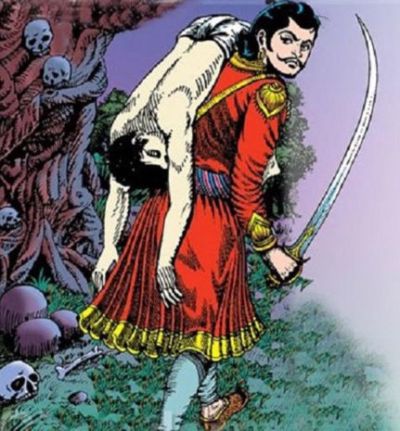“Please forgive me, I have committed a sin but unknowingly. Please think of me as someone who has come to you asking for your protection.”
“I will give you whatsoever you desire, be it man or animal, so that you can be appeased and your anger may subside…”
Jvālāmukha thought to himself “Yes, this will do”, and so looked back at the king and said…

यः सप्तवर्षदेश्यो ऽपि महासत्त्वो विवेकवान् ।
त्वदर्थे स्वेच्छयात्मानं दद्याद् ब्राह्मणपुत्रकः ॥ १२,२७.७८ ॥
हन्यमानं च यं माता हस्तयोः पादयोः पिता ।
अवष्टभ्यातिसुदृढं संनिवेश्य महीतले ॥ १२,२७.७९ ॥
तादृशं पुरुषं मह्यम् उपहारीकरोषि चेत् ।
स्वयं खड्गप्रहारेण हत्वा सप्तदिनान्तरे ॥ १२,२७.८० ॥
तत् ते क्षमिष्ये न्यक्कारम् अन्यथा तु महीपते ।
सद्यो विनाशयिष्यामि त्वाम् अहं सपरिच्छदम् ॥ १२,२७.८१ ॥
“I will forgive you and forget the insult that you have caused me, only on the following condition.”
“You must find a Brāhman boy, who is not more than seven years old, but is intelligent, and noble enough to sacrifice himself for your sake.”
“Not only that, his mother and father should lay him on the ground, with his mother holding his hands, and the father his feet, while he is being sacrificed.”
“And when you have found such a boy, you must personally conduct the sacrifice, and it should be your sword that slays him.”
“And you have only seven days to comply. If you do so, good, else I will kill you and your wife, and destroy your kingdom.”
श्रुत्वैतत् स भयाद् राजा प्रतिपेदे तथेति तत् ।
तिरोबभूव च ब्रह्मराक्षसः सो ऽपि तत् क्षणम् ॥ १२,२७.८२ ॥
अथ चन्द्रावलोको ऽसौ राजा सेन्दीवरप्रभः ।
हयारूढस् ततः प्रायात् सैन्यं चिन्वन् सुदुर्मनाः ॥ १२,२७.८३ ॥
अहो अहं मृगयया मदनेन च मोहितः ।
गतः पाण्डुर् इवाकाण्डे विनाशं बत बालिशः ॥ १२,२७.८४ ॥
प्राप्यते ह्य् उपहारो ऽस्य राक्षसस् तादृशः कुतः ।
तन् निजं नगरं तावद् यामि पश्यामि भावि किम् ॥ १२,२७.८५ ॥
इति ध्यायन् स च प्राप स्वसैन्यं चिन्वद् आगतम् ।
तद्युक्तश् च सदारः स्वं चित्रकूटम् अगात् पुरम् ॥ १२,२७.८६ ॥
तत्र तस्योचितां भार्याप्राप्तिं वीक्ष्य कृतोत्सवे ।
राष्ट्रे ऽन्तर्गतदुःखस्य दिनशेषो जगाम सः ॥ १२,२७.८७ ॥
द्वितीये ऽह्नि रहः सर्वं स्ववृत्तान्तं शशंस सः ।
मन्त्रिभ्यस् तेषु चैकस् तं मन्त्री सुमतिर् अब्रवीत् ॥ १२,२७.८८ ॥
विषादो देव ते मा भूद् उपहारं हि तादृशम् ।
आनेष्याम्य् अहम् अन्विष्य बह्वाश्चर्या हि मेदिनी ॥ १२,२७.८९ ॥
When the king heard this, he was terrified, and agreed at once, lest the Rākshasa get offended and kill him right there.
Seeing the king nod his head in agreement, Jvālāmukha roared with laughter, and disappeared from the scene.
As King Candrāvaloka mounted his horse, and set out with his wife. he started to feel dejected. He thought to himself…
“Oh, I was so enamored by the act of hunting, and so led by my desires, that I now face the same situation as King Pāṇḍu did in his lifetime. What a fool I am! From where will I be able to get such a boy, who has such parents, and that too in just seven days?”
“Anyway, I have to try. Let me reach the city, and then I will think about what to do…”
He was lost in such thoughts until he managed to locate his entourage, and together, they set out to Citrakūṭa.
As they entered the city, the whole kingdom rejoiced, delighted that their king had found a wife as beautiful as Indīvaraprabhā, but the king rode on, lost in his sorrows.
The next morning, he called a meeting of his cabinet of ministers, and told them what had happened.
One of the ministers – Sumati, reassured him and said…
“Don’t worry my king. I will search and bring to you such a boy. This world has many strange things to offer, and so I am sure that I will be successful.“
Sumati then bowed to the king, and then went back to his chambers, and…
to be continued…
